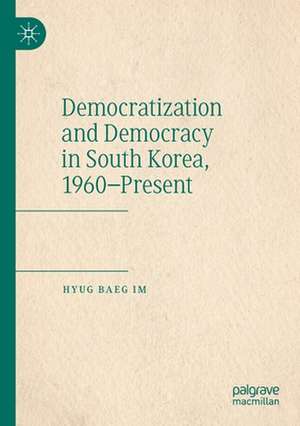Democratization and Democracy in South Korea, 1960–Present
Autor Hyug Baeg Imen Limba Engleză Paperback – 16 aug 2021
This book analyses democratization and democracy in South Korea since 1960. The book starts with an analysis of the distinctive characteristics of bureaucratic authoritarianism and how democratic transition had been possible after inconclusive and protracted “tug of war” between authoritarian regime and democratic opposition. It then goes on to explore what the opportunities and constraints to the new democracy are to be a consolidated democracy, how new democracy had changed the industrial relations in the post-transition period, how premodern political culture such as Confucian patrimonialism and familism had obstructed democratic consolidation, and the improvement of quality of democracy. The author compares empirically, from the perspective of a comparative political scientist, political regime superiority of democracy over authoritarianism with regard to economic development. He concludes that “democratic incompetence” theory has been proven wrong and, in South Korea, democracy has performed better than authoritarian regimes in terms of economic growth with equity, employment, distribution of income, trade balance, and inflation.
This book will benefit political scientists, development economists, labor economists, religious sociologists, military sociologists, and historians focusing on East Asian history.
| Toate formatele și edițiile | Preț | Express |
|---|---|---|
| Paperback (1) | 891.27 lei 6-8 săpt. | |
| Springer Nature Singapore – 16 aug 2021 | 891.27 lei 6-8 săpt. | |
| Hardback (1) | 896.52 lei 6-8 săpt. | |
| Springer Nature Singapore – 15 aug 2020 | 896.52 lei 6-8 săpt. |
Preț: 891.27 lei
Preț vechi: 1086.92 lei
-18% Nou
Puncte Express: 1337
Preț estimativ în valută:
170.57€ • 176.20$ • 141.95£
170.57€ • 176.20$ • 141.95£
Carte tipărită la comandă
Livrare economică 26 martie-09 aprilie
Preluare comenzi: 021 569.72.76
Specificații
ISBN-13: 9789811537059
ISBN-10: 9811537054
Pagini: 319
Ilustrații: XXIII, 319 p. 31 illus.
Dimensiuni: 148 x 210 mm
Greutate: 0.45 kg
Ediția:1st ed. 2020
Editura: Springer Nature Singapore
Colecția Palgrave Macmillan
Locul publicării:Singapore, Singapore
ISBN-10: 9811537054
Pagini: 319
Ilustrații: XXIII, 319 p. 31 illus.
Dimensiuni: 148 x 210 mm
Greutate: 0.45 kg
Ediția:1st ed. 2020
Editura: Springer Nature Singapore
Colecția Palgrave Macmillan
Locul publicării:Singapore, Singapore
Cuprins
1. Introduction: My democratization studies in retrospect.
2. The rise of bureaucratic authoritarianism in South Korea.
3. Recasting Park Chung Hee's authoritarianism: myths, reality, and legacies.
4. Politics of democratic transition from authoritarian rule in South Korea.
5. Christian churches and democratization in South Korea.
6. Opportunities and constraints to democratic consolidation in South Korea.
7. From affiliation to association: the challenge of democratic consolidation in Korean industrial relations.
8. Faltering democratic consolidation in South Korea: democracy at the end of Three Kims era.
9. The development and change of Korean democracy since democratic transition in 1987: Three Kims Politics and after.
10. Democratic development and authoritarian development compared.
11. Better democracy, better economic growth?
Recenzii
“The book offers a wide overview of Korean democratization and a lengthy scholarly career committed to understanding it. … This multi-faceted volume could serve many academic audiences from political science to Korean Studies and overall the book is a fine testament to a productive career and promises future contributions to our understanding of recent developments in the course of democracy in South Korean politics and society.” (Inga Kim Diederich, European Journal of Korean Studies, Vol. 20 (2), 2021)
Notă biografică
Hyug Baeg Im is a professor emeritus at Korea University and a chaired professor at GIST. He received his M.A. and Ph.D. from the University of Chicago, USA. He served as an EC member of IPSA and received ROK National Academy of Sciences Prize. Prof. Im's recent publications include The Possibility of Peace in the Korean Peninsula (2017) and Mongering North Korean Democracy for Inter-Korean Peace (2015).
Textul de pe ultima copertă
This is a perfect one-country study: deeply engaged in the theoretical and comparative literature, intimately informed about South Korean history, bringing to bear some unknown aspects of the case. A major contribution to studies of authoritarianism and of transitions to democracy.
—Adam Przeworski, Carroll and Milton Petrie Professor Emeritus, Department of Politics, New York University, USA
This book will benefit political scientists, development economists, labor economists, religious sociologists, military sociologists, and historians focusing on East Asian history.
Hyug Baeg Im is a professor emeritus at Korea University and a chaired professor at GIST. He received his M.A. and Ph.D. from the University of Chicago, USA. He served as an EC member of IPSA and received ROK National Academy of Sciences Prize. Prof. Im's recent publications includeThe Possibility of Peace in the Korean Peninsula (2017) and Mongering North Korean Democracy for Inter-Korean Peace (2015).
Caracteristici
Analyzes key issues of democratization and democracy through the window of South Korean experiences
Utilizes game-theoretical model, strategic choice model, and the theory of “possibilism” (Albert O. Hirschman) that stresses agency and contingency in its analyses
Empirically analyzes comparative advantage of democracy over an authoritarian regime with regard to economic development
Utilizes game-theoretical model, strategic choice model, and the theory of “possibilism” (Albert O. Hirschman) that stresses agency and contingency in its analyses
Empirically analyzes comparative advantage of democracy over an authoritarian regime with regard to economic development
